| |||
|---|---|---|---|
| +... |
This is a list of Brazilian television related events from 1988.
| |||
|---|---|---|---|
| +... |
This is a list of Brazilian television related events from 1988.
| | This section is empty. You can help by adding to it. (March 2015) |
| | This section is empty. You can help by adding to it. (March 2015) |
| Network | Type | Launch date | Notes | Source |
|---|---|---|---|---|
| Old network name | New network name | Type | Conversion Date | Notes | Source |
|---|---|---|---|---|---|
| Network | Type | Closure date | Notes | Source |
|---|---|---|---|---|
| | This section is empty. You can help by adding to it. (March 2015) |

Brazil, officially the Federative Republic of Brazil, is the largest and easternmost country in South America and in Latin America. Brazil is the world's fifth-largest country by area and the seventh most populous. Its capital is Brasília, and its most populous city is São Paulo. The federation is composed of the union of the 26 states and the Federal District. It is the only country in the Americas to have Portuguese as an official language. Brazil is one of the most multicultural and ethnically diverse nations, due to over a century of mass immigration from around the world.

DomPedro I was the founder and first ruler of the Empire of Brazil, where he was known as "the Liberator". As King Dom Pedro IV, he reigned briefly over Portugal, where he also became known as "the Liberator" as well as "the Soldier King". Born in Lisbon, Pedro I was the fourth child of King Dom John VI of Portugal and Queen Carlota Joaquina, and thus a member of the House of Braganza. When the country was invaded by French troops in 1807, he and his family fled to Portugal's largest and wealthiest colony, Brazil.

The Federal District is one of 27 federative units of Brazil. Located in the Center-West Region, it is the smallest Brazilian federal unit and the only one that has no municipalities, being divided into 35 administrative regions. The federal capital of Brazil, Brasília, which is also the seat of government of the Federal District, is located in its territory. The Federal District is almost completely surrounded by the state of Goiás, but it shares a small border with Minas Gerais.

Club de Regatas Vasco da Gama, commonly referred to as Vasco da Gama or simply Vasco, is a sports club based in Rio de Janeiro, Brazil. Although originally a rowing club and then a multi-sport club, Vasco is mostly known for its men's football team, which currently competes in the Campeonato Brasileiro Série A, the top tier of the Brazilian football league system, and in the Campeonato Carioca, the state of Rio de Janeiro's premier state league.

Esporte Clube Bahia is a Brazilian professional football club, based in Salvador, capital city of the Brazilian state of Bahia. The club competes in the Campeonato Baiano, Bahia's state league, and the Campeonato Brasileiro Série A, highest division of Brazilian football league system.

The municipalities of Brazil are administrative divisions of the Brazilian states. Brazil currently has 5,570 municipalities, which, given the 2019 population estimate of 210,147,125, makes an average municipality population of 37,728 inhabitants. The average state in Brazil has 214 municipalities. Roraima is the least subdivided state, with 15 municipalities, while Minas Gerais is the most, with 853. Northern states are divided into small numbers of large municipalities, and therefore they cover large areas incorporating several separated cities or towns that do not necessarily conform to one single conurbation. Southern and eastern states on the other hand, are divided into many small municipalities, and therefore large urban areas usually extend over several municipalities which form one single conurbation.
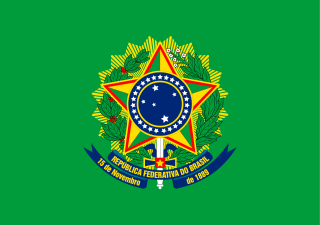
The president of Brazil, officially the president of the Federative Republic of Brazil or simply the President of the Republic, is the head of state and head of government of Brazil. The president leads the executive branch of the federal government and is the commander-in-chief of the Brazilian Armed Forces.

Romário de Souza Faria, known simply as Romário, is a Brazilian politician and former professional footballer. A prolific striker renowned for his clinical finishing, he scored over 700 goals and is one of the few players to score at least 100 goals for three clubs. He is considered one of the greatest players of all time. Romário starred for Brazil in their 1994 FIFA World Cup triumph, receiving the Golden Ball as player of the tournament. He was named FIFA World Player of the Year the same year. He came fifth in the FIFA Player of the Century internet poll in 1999, was elected to the FIFA World Cup Dream Team in 2002, and was named in the FIFA 100 list of the world's greatest living players in 2004.
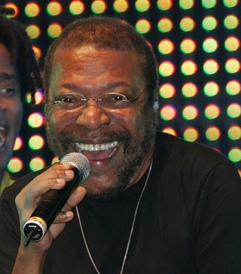
Martinho da Vila is a Brazilian singer and composer who is considered to be one of the main representatives of samba and MPB. He is a prolific songwriter, with hundreds of recorded songs across over 40 solo albums. He also has many songs that were recorded by singers from different musical genres.

Iomar do Nascimento, known as Mazinho, is a Brazilian football manager and former player. Mazinho played primarily as a defensive midfielder and a full-back in his professional playing career. As a manager, he had a short spell at Greek club Aris in 2009.
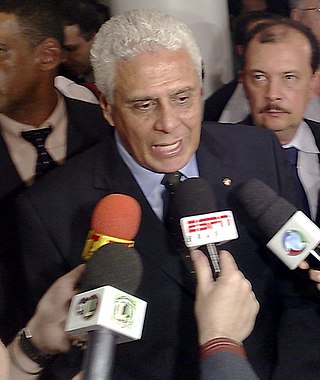
Carlos Roberto de Oliveira, known as Roberto Dinamite, was a Brazilian footballer and politician. He was born in Duque de Caxias, Rio de Janeiro state. With a career as centre forward spanning over twenty years, Roberto is Vasco da Gama's player with the most appearances and all-time top goalscorer, as well as the overall leading scorer in the Brazilian Série A and the Rio de Janeiro State Championship. At the national level, Roberto Dinamite played in the 1978 and 1982 FIFA World Cups and the 1972 Olympic Games. He was president of Vasco da Gama from 2008 to 2014.

Paulo Mendes da Rocha was a Brazilian architect.

The Public Prosecutor's Office is the Brazilian body of independent public prosecutors at both the federal and state level. It operates independently from the three branches of government. It was once referred to by constitutional lawyer and former president Michel Temer as a "Fourth Branch". The Constitution of 1988 divides the functions of the Public Prosecutor's Office into three different bodies: the Public Procurator's Office, the Public Defender's Office and the Public Prosecutor's Office itself, each one of them an independent body. In addition to that, the new Constitution created the Federal Court of Accounts, which is also autonomous in its functions.

The Brazil national futsal team represents Brazil during international futsal competitions. It is under the direction of the Brazilian Football Confederation (CBF). The team is considered to be the strongest in the world earning a record three straight championships in the FIFA Futsal World Cup. Brazil also holds a record twelve championship wins in the South American Futsal Championship also known as the Copa América de Futsal and five wins in the Taça América de Futsal. As of November 2016, Brazil is ranked first in the Futsal World Rankings. Brazil has played in all FIFA Futsal World Cups and has finished in the top three places eight times, which includes the recent Futsal World Cup in 2021, having the best overall performance in the World Cup competition both in proportional and absolute terms.
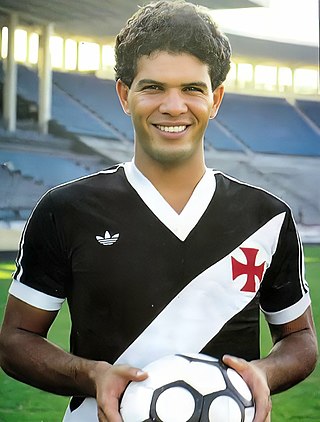
Geovani Faria da Silva, referred to simply as Geovani Silva or Geovani, is a Brazilian former footballer who played as a midfielder.
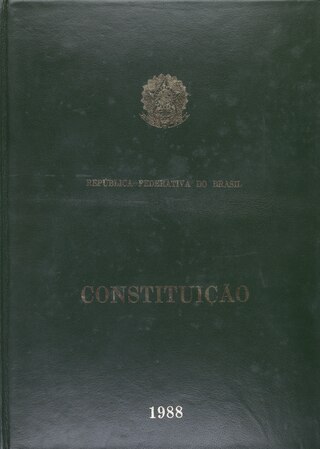
The Constitution of the Federative Republic of Brazil is the supreme law of Brazil. It is the foundation and source of the legal authority underlying the existence of Brazil and the federal government of Brazil. It replaced the autocratic 1967 constitution capping 21 years of military dictatorship and establishing Brazil's 6th republic, also known as the New Republic. Made in the light of the Brazilian transition to democracy, it resignified the role of the state in the citizens' lives, providing a vast system of human and individual rights protection, social welfare, and democratic tools.
Daniel Dutra da Silva is a professional tennis player from Brazil who competes mostly on the ATP Challenger Tour.
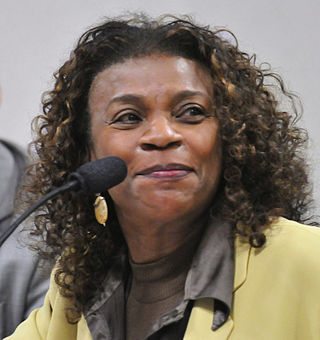
Maria José Motta de Oliveira, known as Zezé Motta, is a Brazilian actress and singer. She is considered one of the most important actresses in Brazil.
Sérgio Paulo Rouanet was a Brazilian diplomat, philosopher, essayist, and scholar. He was the national Secretary of Culture between 1991 and 1992, and in his tenure he created the Lei de Incentivo à Cultura, a tax credit law for companies and citizens that sponsor cultural activities, which became known as Rouanet Law.